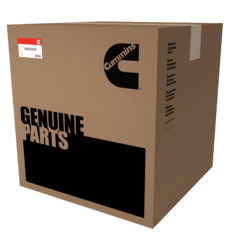This truck part is made by Cummins®. We guarantee that all of our parts are from the OEM (original equipment manufacturer), ensuring a proper fit and quality manufacturing.
We honor the warranty provided by the original equipment manufacturer.
The Cummins 3056284 Push Rod is a component designed for use in heavy-duty truck engines. It serves a specific function within the engine system, contributing to the overall operation and performance of the vehicle. Understanding its role and significance can provide valuable insights into the complexities of engine mechanics and the importance of each component in ensuring efficient and reliable truck operation.
Basic Concepts of Push Rods
Push rods are mechanical components used in overhead valve (OHV) engines to transfer motion from the camshaft to the valves. They are typically long, slender rods that connect the camshaft, which is located in the engine block, to the rocker arms, which are positioned in the cylinder head. As the camshaft rotates, it actuates the push rods, which in turn move the rocker arms. This motion opens and closes the valves, allowing air and fuel into the combustion chamber and expelling exhaust gases. Push rods play a role in the engine’s valve train by ensuring precise and timely valve operation, which is crucial for engine performance and efficiency 1.
Purpose of the Cummins 3056284 Push Rod
This Cummins part is specifically engineered to function within the valve train of Cummins engines. It facilitates the transfer of motion from the camshaft to the rocker arms, ensuring that the valves open and close at the correct times. This precise timing contributes to the engine’s overall performance and efficiency, allowing for optimal combustion and power output. The push rod’s design and material composition are tailored to withstand the high stresses and temperatures encountered in heavy-duty truck engines, ensuring reliable operation under demanding conditions.
Key Features
This part is characterized by several key features that enhance its functionality and durability. It is constructed from high-quality materials, such as heat-treated steel, which provides strength and resistance to wear. The push rod’s design includes precise machining to ensure smooth operation and minimal friction. Additionally, it may feature specific coatings or treatments to further improve its durability and performance in high-stress environments. These characteristics contribute to the push rod’s ability to maintain reliable operation over the long term.
Benefits of Using Cummins Push Rods
Incorporating Cummins 3056284 Push Rods into truck engines offers several advantages. These push rods are designed to enhance engine performance by ensuring precise valve timing and efficient operation. Their high-quality construction contributes to the reliability and longevity of the engine, reducing the likelihood of premature failure or maintenance issues. Cummins push rods are engineered to meet the demanding requirements of heavy-duty applications, providing truck operators with confidence in their engine’s performance and durability.
Installation and Maintenance
Proper installation of this part is crucial for ensuring optimal performance and longevity. Installation procedures should follow manufacturer guidelines to ensure correct positioning and secure fitting within the engine. Regular maintenance practices, such as inspecting for wear, checking for proper lubrication, and ensuring there is no damage or deformation, are recommended to maintain the push rod’s performance. Identifying and addressing common issues, such as excessive wear or misalignment, can help prevent more significant problems and ensure continued reliable operation.
Troubleshooting Common Issues
Frequent problems associated with push rods can include wear, bending, or breakage due to high stresses and temperatures. Diagnostic methods for detecting issues with this Cummins part may involve visual inspection for signs of wear or damage, checking for proper operation within the valve train, and performing compression tests to assess engine performance. Suggested solutions or repairs may include replacing worn or damaged push rods, ensuring proper lubrication, and addressing any underlying issues within the engine that may contribute to push rod failure.
Cummins: A Brief Overview
Cummins Inc. is a global power leader that designs, manufactures, and distributes engines, filtration, and power generation products. With a history spanning over a century, Cummins has established a reputation for quality, innovation, and reliability in the automotive and heavy-duty truck industry. The company’s commitment to advancing technology and meeting the needs of its customers is evident in its diverse product range, which includes engines, components, and systems designed for a variety of applications. Cummins’ dedication to quality and performance is reflected in its push rod offerings, which are engineered to meet the demanding requirements of heavy-duty truck engines 2.
Conclusion
The Cummins 3056284 Push Rod plays a vital role in the operation of heavy-duty truck engines by ensuring precise and timely valve operation. Its high-quality construction, precise machining, and durable materials contribute to the engine’s performance, reliability, and longevity. Proper installation, regular maintenance, and prompt troubleshooting of common issues are essential for maximizing the benefits of this part and ensuring the continued efficient operation of the engine.
SPECIFICATIONS
RECOMMENDED PARTS
* Variable geometry turbocharger and electronic actuator repairs are not eligible to be claimed as over-the-counter under New or ReCon parts warranty for parts installed after October 1, 2018.
* Diesel Oxidation Catalyst (DOC), Diesel Particulate Filter (DPF), Selective Catalyst Reduction (SCR) catalyst, and Electronic Control Module (ECM) repairs are not eligible to be claimed as over-the-counter under New or ReCon parts warranty for parts installed after January 1, 2020.
* These restrictions are only applicable to New parts and ReCon parts coverages for the components listed above sold to a customer in the US or Canada. All other coverages are excluded. All other regions are excluded.

